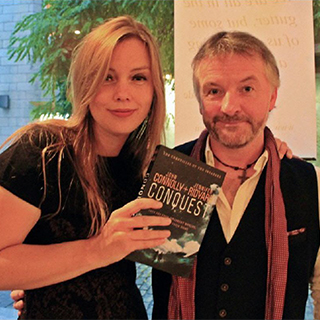October 17, 2014
 Jennie Ridyard is a former South African who moved to Ireland and followed her dreams of becoming a published author. Jennie can be described as an entertaining, passionate and driven woman, who is a prime example of someone who got up, pursued her dreams and found success. Jennie’s story of success is proof that when a dream is combined with hard work and dedication then the impossible suddenly becomes possible. Jennie has recently published her first book with well-known Irish author, John Connolly. She explains in an intimate interview with the Be Your Dream team that “to hug a copy of your own book, to stroke a cover with your name on – that’s magical.” Jennie Ridyard and John Connolly’s book, Conquest, is now available in most shops across South Africa.
Jennie Ridyard is a former South African who moved to Ireland and followed her dreams of becoming a published author. Jennie can be described as an entertaining, passionate and driven woman, who is a prime example of someone who got up, pursued her dreams and found success. Jennie’s story of success is proof that when a dream is combined with hard work and dedication then the impossible suddenly becomes possible. Jennie has recently published her first book with well-known Irish author, John Connolly. She explains in an intimate interview with the Be Your Dream team that “to hug a copy of your own book, to stroke a cover with your name on – that’s magical.” Jennie Ridyard and John Connolly’s book, Conquest, is now available in most shops across South Africa.What made you decide to leave South Africa and move to Ireland? It seems to have been a big step to make, and one that has really had positive effects on your life.
A man! Ask any woman and it’s usually a man, dragging her away from the sunshine… Seriously, I was working for The Citizen newspaper when I interviewed a certain Irish author (crime writer John Connolly) and we hit it off. A friendship began, conducted largely by email and telephone, and finally, in April 2002, we decided to try a relationship, though I swore I would never leave South Africa. However, at Christmas time 2003, he was knocked off his bicycle and broke his arm really badly. I was far away and the only person who knew he was in hospital, or who visited, was his mum. One day a nurse said “Do you live with your mum dear?” I think that was the clincher. He declared he needed a girlfriend in the same country as him, and decisions had to be made. I moved to Ireland in August 2004. I brought my children with me, but I still have a house in South Africa where my soul lives on rainy days in Dublin. My family are still in South Africa. And a large chunk of my heart.
Writing is a difficult process, which requires hard-work, patience and dedication. Have you ever felt disheartened or wanted to give up on your writing?
Oh yes! Sometimes I’m convinced I’m no good, just a sham and a con-artist, but I suspect that’s how most people feel about what comes naturally to them. And, unfailingly, when I’m writing and hit a tough bit, I start thinking of loads of other things I’d like to write about and then I have to fight the urge to pack it all in and start again. Ultimately, writer’s write and they finish writing. When it becomes a slog, you just have to keep plodding onwards. Being disheartened is normal too. On those days, I’ve learned that all you can do is go and sit in front of your computer and start writing. The muse very rarely comes unbidden – some days you have to go looking for her.
The road towards being published is a long and difficult one, and often it is filled with many potholes and detours. How many times has your writing been turned down and have ever had to drastically change a story idea to suit a publisher’s wishes?
We only ever hear the good stories, the JK Rowling stories, when it comes to writing. The truth of the matter is that most writers have other jobs too, as do most musicians and artists, because it’s a very difficult way to make a living. Those who do write fulltime are the lucky ones. My first manuscript was roundly rejected by agents in the UK. One even said “You write a lively covering letter. It’s a pity about the manuscript…”
I made numerous changes and resubmitted, and finally found what I hoped would be a publisher, but they asked for more changes, then more changes – “we are not comfortable with the incest in the manuscript” was the gist of it – and then the editor I’d been dealing with left the company! Suddenly I was back to the beginning.
Some aspiring authors spend years knocking on the doors of various publishers, wanting nothing more than to be let in and have their story printed and read. How did you finally manage to open this door?
 Some successful, lauded, exquisite writers still struggle to get publishes, even after they’re already in print. Take the example of the exquisite wordsmith James Lee Burke (and this is a story I held tight for many years): his wonderful fourth manuscript, The Lost Get-Back Boogie, was under submission for nine years and was rejected 11 times! But The Lost Get-Boogie was ultimately nominated for a Pulitzer Prize.
Some successful, lauded, exquisite writers still struggle to get publishes, even after they’re already in print. Take the example of the exquisite wordsmith James Lee Burke (and this is a story I held tight for many years): his wonderful fourth manuscript, The Lost Get-Back Boogie, was under submission for nine years and was rejected 11 times! But The Lost Get-Boogie was ultimately nominated for a Pulitzer Prize.
As for me, I found an agent who saw potential in what I was doing – an agent is rather pivotal to most success stories. I sent my first three chapters and a synopsis of my completed manuscript to about 15 agents, after the first reading the list of agents in The Writers’ and Artists’ Yearbook thoroughly to see who might be interested in what I was doing. Yet that first book was never successful and I never submitted the others. I think I lost my nerve.
It was only when John and I wrote Conquest that I was back in the game, and now we share an agent. Agents know what publishing houses are looking for; they have personal relationships with editors. A good agent can be instrumental in helping to shape a story, especially when it’s lost the run of itself somewhat. Yes, they take a chunk of any money you make, but you probably wouldn’t make any at all if it hadn’t been for their skills, contacts and mentoring. And it’s nice to have someone on your side.
But a good agent should NEVER charge you just to read your work.
Do you have any advice for people who are aspiring to live out their dreams? And at the same time, do you have any advice for people who feel like giving up on their dreams?
Again, writers write. Musicians make music. Dancers dance. Merely talking about what you want to do won’t get you anywhere. You actually have to sit down (or stand up) and do it, regularly, whatever you want to do.
As for giving up, well, you’ll never be a writer / accountant / singer/ dress designer / whatever by giving up. But sometimes, if it’s really destroying you, I think we need to give ourselves permission to walk away. There’s no shame in realising maybe something isn’t for you. There are other ways to fill a soul. There are other dreams to be had.
When I was young and ignorant I used to think that I should follow a path towards success no matter what. I used to promise myself that once I’d achieved my dreams then my mission would be accomplished and I could spend the rest of my life relaxing on the beach with a martini. Do you feel as if you’ve achieved your dreams and can now spend the rest of your life relaxing? Or do you instead feel as if the bar has been lifted and that there are now other goals for you to strive towards?
My goodness, no! I’m old and ignorant. My dream is to be a published author in my own right, but even worse, I want to be a bestselling published author, with only approval from critics to attach to my name! And while I’m at it I want to meet Brad Pitt on the red carpet as he stars in the hit movie of my book. I want to tease him while Angelina Jolie and I lie on loungers on a yacht, drinking margaritas cut with Cointreau. He’ll be looking at us both with such affection and I’ll be godmother to all their children. I’ll dedicate a (bestselling, critically-acclaimed) book to each of them, and eventually I’ll win the Pulitzer, and Chmamanda Ngozi Adichie and Lauren Beukes will take me to dinner to celebrate. So there.
Yup, there are always new goals, and new fantasies, however ridiculous. Dreaming stuff up is central to being a writer, after all. Well, that’s my excuse.
The definition of a good story differs from person to person. What would you say is the secret ingredient in a good story and what does a good story have to contain to make it magical?
 If I knew the answer to that question, I’d be called Joanne and living in Scotland in a dress paid for by wizards. But I think the atmosphere of the setting is a critical part of any story’s success, and also I know that nothing will work unless it has a flawed, fallible, fragile human running it. Yes, even if the main characters are hedge hogs, aliens, tress or cupcakes. Characters make or break a story: get them wrong and the plotline, however brilliant, will generally fall flat. Unless you’re Dan Brown.
If I knew the answer to that question, I’d be called Joanne and living in Scotland in a dress paid for by wizards. But I think the atmosphere of the setting is a critical part of any story’s success, and also I know that nothing will work unless it has a flawed, fallible, fragile human running it. Yes, even if the main characters are hedge hogs, aliens, tress or cupcakes. Characters make or break a story: get them wrong and the plotline, however brilliant, will generally fall flat. Unless you’re Dan Brown.
There are a few writers who have admitted that they have often found themselves interacting with the characters from their books. They say that in doing this their books become a lot more emotional, as if they were written about real people rather than imagined characters. Do you ever find yourself having conversations with the characters from your books?
I do. And I say their lines for them aloud, because I often talk to myself as I write. Sometimes I absently wonder where they are and what they’re doing when I’m not with them, rather like I do with my children. It’s very fey of me. However, it’s never on purpose, and I do check myself.


